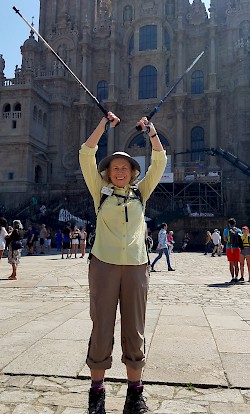REFLECTION
A religious pilgrimage by the non-religious?
Insights from conversations along the Camino de Santiago

By Linda Mercadante
Professor of Theology in the Straker Chair of Historical Theology
Walking the Camino de Santiago, an ancient Catholic pilgrimage in Spain, was never on my bucket list. But my husband, with his Catholic Cuban roots and Spanish heritage, really wanted to walk the Camino. And I saw a valuable connection to much of my work.
My book Belief Without Borders: Inside the Minds of the Spiritual but not Religious, explores why so many people are rejecting religion and the church today. This set up a dilemma for me. About 80 percent of the peregrinos (pilgrims) who walk this long and difficult ancient Catholic pilgrimage route are not at all religious. Some are “spiritual but not religious,” many are thoroughly secular and, as I found out, a few are actively hostile toward religion.
And yet every year, tens of thousands of people walk the Camino, a route abounding with ancient churches, crosses, plaques, shrines, and statues. The ultimate goal is to reach the massive Cathedral de Santiago de Compostela, where the apostle James is said to be buried. While you wait at the cathedral to get your certificate of completion, you have to fill out a form which asks if you have done this for religious or spiritual reasons. The point of the journey seems clear-cut: It has always been religious.
Why would someone undertake this arduous and often painful Catholic pilgrimage if they were uninterested in or negative about religion and the church? As we walked and as we rested at various alburgues, cafes and stops, I set about asking people just that.
On the surface, it was obvious that some people, especially the younger, fitter ones, were doing it to challenge themselves, to have an outdoor adventure, to take a trip with their friends. One middle-aged man was walking with his 20-something daughter. He said he wanted to give her a fun trip before she starts medical school. Another man, who actually was a practicing Catholic, insisted he was not doing this for religious reasons but simply because he liked to be outdoors and to walk.
But by probing deeper, I also found more transcendent motivations. We did meet some religious people, and they often said they were walking to express gratitude for their lives, to pray for something, or because this was an important religious pilgrimage.
Non-religious people, though, had entirely different reasons. Many were trying to tend to their mental and emotional states. One 40ish woman, having recently gotten divorced, said she wanted to “empty my mind,” something she considered a spiritual goal. A young software engineer from Seattle spurned the idea that the Camino was religious or spiritual.
One 30ish English man recounted spending a previous vacation touring Spain on his motorcycle. One day a man rushed up to him with a big smile on his face and gave him a bear hug. “I was surprised, of course, and asked him why. The man said, ‘I just got done walking the Camino, and you are the first person I have seen.’ Right then and there, I wanted to trade my motorcycle key for his hiking sticks! I wanted what he had.”
The real question is: Do deeper spiritual motivations underlie any of this? Can we claim, as did some of the nuns and monks I spoke with, that these are, deep-down, essentially religious reasons, especially since the Camino ends at the tomb of St. James?
Is it spiritual to want to be distracted from the cares of life, rather than specifically seeking an encounter with God? Are the health and fitness motivations about as close to a this-worldly salvationary goal as secular people can get? Can the spiritual but not religious get to God simply through being out in nature? Or do they need something more specific to help them open to the divine?
I will be working on these questions as I continue to think about this arduous but ultimately transformative journey. I discovered that the Camino has a unique way of giving God better access to you – if you are willing. h
Methodist Theological School in Ohio provides theological education and leadership in pursuit of a just, sustainable and generative world. In addition to the Master of Divinity degree, the school offers master’s degrees in counseling, social justice, theological studies and practical theology, along with a Doctor of Ministry degree.
CONTACT:
Danny Russell, communications director
drussell@mtso.edu, 740-362-3322